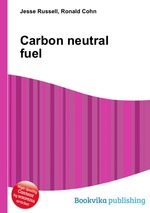Carbon neutral fuel
Jesse Russell Ronald Cohn
бумажная книга
High Quality Content by WIKIPEDIA articles! Carbon neutral fuel is synthetic fuel such as methane, gasoline, diesel fuel, jet fuel or ammonia. The hydrocarbon based fuels may be produced from renewable or nuclear energy used to hydrogenate waste carbon dioxide recycled from power plant flue exhaust gas or derived from carbonic acid in seawater. Ammonia is produced by hydrogenating nitrogen extracted from the atmosphere. Such fuels are potentially carbon neutral because they do not result in a net increase in atmospheric greenhouse gases. To the extent that carbon neutral fuels displace fossil fuels, or if they are produced from waste carbon or seawater carbonic acid, and their combustion is subject to carbon capture at the flue or exhaust pipe, they result in negative carbon dioxide emission and net carbon dioxide removal from the atmosphere, and thus constitute a form of greenhouse gas remediation. Such carbon neutral and carbon negative fuels can be produced by the electrolysis of water to make hydrogen used in the Sabatier reaction to produce methane which may then be stored to be burned later in power plants as synthetic natural gas, transported by pipeline, truck, or tanker ship, or be used in gas to liquids processes such as the Fischer–Tropsch process to make traditional fuels for transportation or heating.


